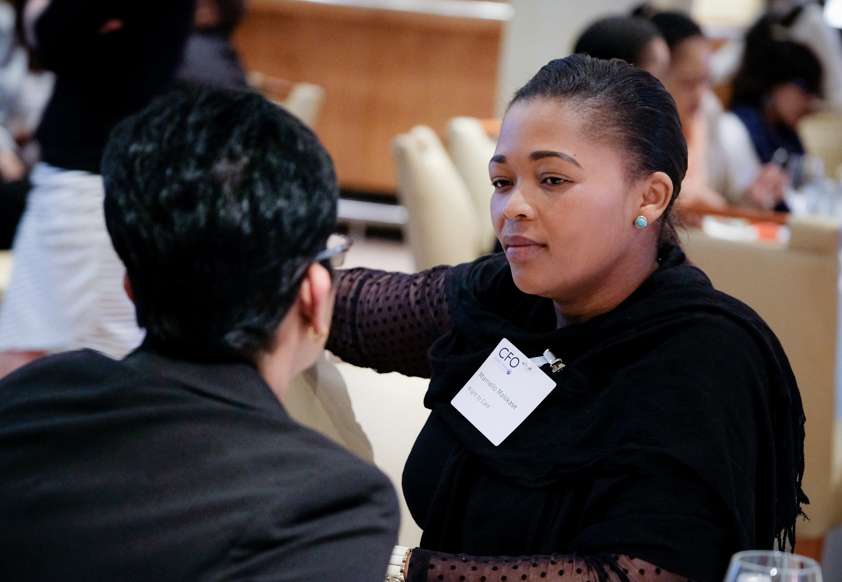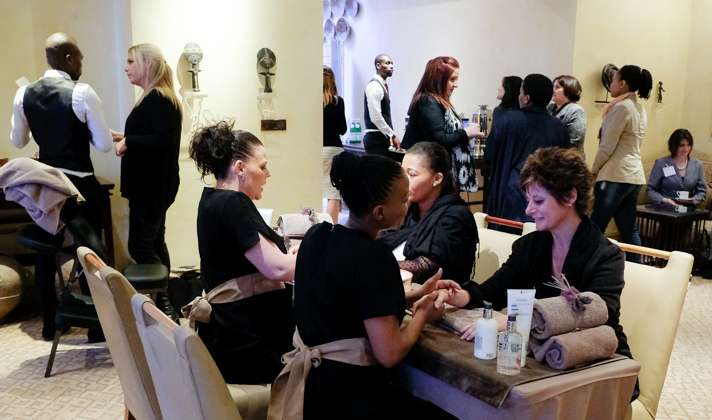- How can women leaders reach their full potential? A chat to Inge Walters.
- CFO SA's first women's dinner discusses influence and power.
Addressing the theme of 'Influencing through presence', Inge began her mini workshop by sharing a model for learning, called the O + A = R model. The 'O' stands for observe, the 'A' for action, and the 'R' for result. In explaining Inge said: "When you want to change something, you action it. But first you must observe. Before we can change anything we need to look at how we see ourselves and the world. Things won't' change in the longer term unless you can shift how you see things, yourself and others."
 Inge then went on to talk about the BEL model, where 'B' stands for body, 'E' for emotion and 'L' for language. "We think of ourselves as existing only from the head upwards. We forget that we have more than just a head," she said. "We need to consider body, emotion and language. We do ourselves an injustice if we don't look at all three of these things, because they combine to bring a holistic perspective."
Inge then went on to talk about the BEL model, where 'B' stands for body, 'E' for emotion and 'L' for language. "We think of ourselves as existing only from the head upwards. We forget that we have more than just a head," she said. "We need to consider body, emotion and language. We do ourselves an injustice if we don't look at all three of these things, because they combine to bring a holistic perspective."
Language pertains to the conversations that you have with yourself and others, Inge explained, with conversations had with yourself being the most critical. "Language is generative, it creates experiences and relationships. The voice in your head tends to be more critical because we are always more critical of ourselves. But research has shown that if you invest this same amount of time and energy into improving your strengths, the results are exponential."
 Inge advised everybody to work on unearthing their strengths, rather than to dwell on their weaknesses. She also pointed out that often, a weakness is simply an over-developed strength. But focussing on your positive characteristics is easier said than done. Inge's suggestion: "Find something small that you can do every day that becomes a habit; only then will you benefit from it. For example, once a day, think about how you can use your strengths to have a good day. If you are anxious or nervous about something, focus on how you can use your strengths to address that."
Inge advised everybody to work on unearthing their strengths, rather than to dwell on their weaknesses. She also pointed out that often, a weakness is simply an over-developed strength. But focussing on your positive characteristics is easier said than done. Inge's suggestion: "Find something small that you can do every day that becomes a habit; only then will you benefit from it. For example, once a day, think about how you can use your strengths to have a good day. If you are anxious or nervous about something, focus on how you can use your strengths to address that."
Inge then worked through two short exercises with everyone. The first was a means to unearth everybody's strongest three characteristics. The second involved a difficult conversation with a direct report, with an emphasis on solution-focussed dialogue rather than problem-focussed.
 The discussion shifted to body language, and how significantly this can affect how people see each other, as well as themselves. "How you carry yourself affects how you see yourself," Inge said. "Taking a position of power in your body will chemically raise the levels of cortisone and testosterone in your body. In difficult situations, take big positions of posture. Become aware of what you are doing - sit upright and seem confident to feel confident. Don't be naïve about what your body is saying."
The discussion shifted to body language, and how significantly this can affect how people see each other, as well as themselves. "How you carry yourself affects how you see yourself," Inge said. "Taking a position of power in your body will chemically raise the levels of cortisone and testosterone in your body. In difficult situations, take big positions of posture. Become aware of what you are doing - sit upright and seem confident to feel confident. Don't be naïve about what your body is saying."
Next up was emotion, and how important this is. "Emotions can be helpful and effective. You need to embrace them. But you also need to manage them," Inge said. She further explained that the causes of emotion are easily understood by the five core concerns, which are appreciation, affiliation, autonomy, status and role.  She discussed each in turn: "When you feel acknowledged and appreciated for the work you do, it elicits positive emotions. We want to feel that we belong and be treated as a colleague - affiliation. We also want autonomy. We do not want to be told exactly what to do and how to do it. More trust and freedom leads to greater productivity and satisfaction. If you've worked hard to earn something, it is important that that effort is acknowledged; that your status is acknowledged. We like to be acknowledged for how far we've come and what we know. A clearly defined role is always helpful. If you don't know what your purpose and role is in an environment, that makes it difficult."
She discussed each in turn: "When you feel acknowledged and appreciated for the work you do, it elicits positive emotions. We want to feel that we belong and be treated as a colleague - affiliation. We also want autonomy. We do not want to be told exactly what to do and how to do it. More trust and freedom leads to greater productivity and satisfaction. If you've worked hard to earn something, it is important that that effort is acknowledged; that your status is acknowledged. We like to be acknowledged for how far we've come and what we know. A clearly defined role is always helpful. If you don't know what your purpose and role is in an environment, that makes it difficult."
In wrapping up, Inge emphasised the importance of thinking clearly about what you can do differently to create change and to build presence: "You need to look at how you could be creating negative emotions. Then you need to focus on how you can generate positive emotions in yourself to improve your emotional well-being."
Kind regards
Julie Rademan









